Do you sometimes happen to meet someone extraordinary and think “How on Earth can this young man have so many achievements behind his back and be so humble about it”? Minko Gechev is the epitome of the restless innovator and a tech problem solver who is as down-to-earth as it gets. At the age of 30, Gechev leads the Angular Developer Relations team at Google, has exited one startup to a unicorn company, has published three books, has become a renowned open source expert, and is a recipient of the John Atanasoff Award, given to young Bulgarian scientists in the field of computer science for achievements worldwide.
Born and raised in Troyan, Bulgaria, Minko had been building open source tools for Google for the past couple of years. Before that, he was the co-founder and the CTO at the EdTech company Rhyme.com, which in 2019 was acquired by the unicorn Coursera, in a deal that introduced Coursera to the Bulgarian market.
His passion is building open source projects and sharing his work for free with developers around the world with the aim to help them gain expertise and improve their coding practices.
It almost feels too optimistic to relate Gechev’s journey and accomplishments in one story, but The Recursive takes a shot at it. In our interview, we also talk about what is the goal and the impact of building open source projects, how can programming teaching be scaled, and how open source projects change the world for the better.
From Troyan to Silicon Valley
“I learned how to write code when I was in 9th grade in the small town of Troyan in Northern Bulgaria. I got excited about programming thanks to my high school teacher who was a highly-capable software engineer. He taught me PHP, JavaScript, and MySQL,” begins Minko Gechev.
As a young student, he went to many web development competitions, doing pretty much what his job is right now, but competing with other kids for fun. He used to spend half of the year developing web applications, and the other half presenting his projects in front of jury panels.
“I found the whole process of building a system from scratch with only a computer and internet to be a creative and challenging one. The competitive element was bringing me extra motivation to move forward,” he shared. Naturally, his education proceeded in Sofia University where Gechev graduated with BSc in Information Systems and MSc in Software Engineering.
“For one of the products that I used to work on, I used a project built by Google which made me respect the company and the developers who built that technology even more. I started thinking that if I look at the original code of this technology, I would be able to understand the best software engineering practices because this project was developed by the best people in the industry. So I started learning from the source code,” Gechev explains.
Around that time, Gechev was doing an internship at VMware, but his real passion was building open source projects, writing technical blog posts, and sharing best practices with other developers.
“In university, I got excited about open source and started writing about my learnings in a blog. After I ended an internship at VMware, I got an email on my blog from someone asking me if I would like to join their Silicon Valley startup. In the beginning, this seemed like an absolute scam. I talked to the person still and he suggested we start working on April 1st (Fool’s Day). I thought it couldn’t get scammier,” Minko Gechev jokes.
Nevertheless, he jumped into the adventure and started working as a Lead Software Engineer for the US venture capital firm focused on tech-enabled education, Learn Capital. For a couple of years, he worked on the design and development of a browser-based educational game for kids called Brownie Points. And in 2014, he got invited to visit the team in Silicon Valley. The trip multiplied his enthusiasm to contribute to open source and bring impact on the software development community.
Introducing Coursera to the Bulgarian market with an exit
At that time, he was working on a GitHub open source project, plainvm, that was related to controlling virtual machines through any browser. It happened that the team he was working with had stumbled across his project, and together they came up with an idea to make it applicable to education. They started prototyping different ideas and eventually decided to scale the effort and hire a couple of people in Bulgaria.
“Luckily, I knew where to find the right developers for the project – from Sofia University where I was teaching, and from the JavaScript user group that I was running back then. Eventually, this application became Rhyme.com, a platform for hands-on and interactive education. I moved to San Francisco, while most of our engineering team remained in Bulgaria,” Minko Gechev shares.
The startup and its software fell under the radar of Coursera which at that time was already a billion-dollar company. Gechev and his team realized that by partnering with Coursera, they would accelerate the impact of Rhyme.com on improving education. In 2019, Coursera acquired the company, which had a Bulgarian-based R&D team, and was thus introduced to the Bulgarian market.
The road to joining Google Angular
Alongside developing software products, Minko Gechev never ceased to write open source projects and share his know-how and learnings. This work ended up becoming quite popular.
“One of them got translated to 16 languages. With such traction, my content became visible to some publishing houses. That is how Packt Publishing reached out to me one day to invite me to work on their title ‘Switching to Angular’. They mentioned that the creator of Angular would be my technical reviewer, so I immediately said yes,” he remembers.
In 2016 and 2017, he published the trilogy Switching to Angular. While contributing to research in Angular, he found gaps and opportunities for improvement, which he translated into contributions with open source projects. Since the gaps he recognized were problems for other people as well, other developers started using Gechev’s tools.
The combination of open source and the tools, articles, books, and keynote presentations for Angular developers that he gave around the world, resulted in his recognition by the Bulgarian President with the John Atanasoff Award.
Google had noticed the devotion that Gechev had for building tools for other developers and approached him with an offer to join their team full time.
“I managed to join Google thanks to open source. Google noticed the work that I’ve been doing and even used one of the tools that I had built internally. Later that tool was added as part of the official product line for Angular. As with most of the projects that I was building, it was a tool for other developers. The solution is able to look at your code and tell you whether you’re following best practices or not. It is something like Grammarly for software developers,” he explains.
Even though Google invited Minko Gechev to become part of the company, he still had to go through the interview process.
“It looks like in Google, there is no way to skip the interview process. I was hoping so but no. Originally, they invited me for a software engineering role. But what I was truly excited about was teaching people how to use technology. So I was able to negotiate to go for a Developer Relations role. I was preparing for the interview for about two months during which I was solving tons of coding questions. I went to Mountain View for my interview and walked into a room full of interviewers to give a presentation about Angular because that is what I am most experienced in. Miško Hevery, the person who created Angular was one of the people part of my interview panel. I can’t hide that it was intimidating, but eventually, it all went pretty smooth,” Gechev shares on his path to joining Google.

He explains that being in charge of Angular Developer Relations -a big software development product – has a broad scope. His responsibilities are a combination of engineering work, building tools for developers, product management, gathering requirements, presenting at outreach events, and teaching.
Open source for tech and non-tech people
“All people are already familiar with using web and mobile apps. Usually, when the developers are building the software, they write code in textual format. You can think of it as writing plain English with some more strict syntactical rules. After that, they compile it into a program that users can interact with,” Minko Gechev explains.
After compilation, the original source code of the program together with the process of building it is lost. With Open source, rather than sharing only the final program, developers can also share the source code and the instructions on how to get the final program.
“In this way, people can look into the original code of a program, learn from it, and improve it. Developers like to spend a lot of time on GitHub, which is something like a nerdy social media platform for software engineers that lets people comment and like lines of code instead of pictures,” he shares
Open source as a scaling teaching mechanism
Minko Gechev highlights that his fascination with open source stems from the fact that technology provides an equal learning opportunity for everyone. No matter whether developers are based in San Francisco or in Sofia, they have access to the same open source projects.
“So just by joining the global network of open source software engineers, you can work and collaborate with some of the best developers out there. I learned a ton from the Angular team at Google when I was contributing to what was back then AngularJS. I also learned a lot from the different compiler and programming language open source authors. And that is part of the story. Besides learning and collaboration, you can build something that can increase the visibility of your profile,” Gechev explains.







